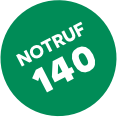SPECIALISTS FOR SPECIFIC CASES
Some special deployment scenarios require emergency personnel who have the appropriate training, experience and, in some cases, the necessary qualifications.
In addition to the dog team and the mountain rescue doctors, there are three other rescue teams that are available if necessary. The canyoning rescuers, who help with accidents in canyons, the recco group, who operate the Recco SAR buoy when searching for missing persons in a helicopter, and the incident management team, which provides support in the event of internal incidents.
LIFE-SAVING TECHNOLOGY
Finding missing persons is a major challenge for mountain rescuers, especially in an alpine setting. For this reason, the Swedish company Recco has further developed the system known from avalanche searches.
Recco reflectors are sewn into clothing and equipment so that they can be located.
The RECCO SAR system was introduced in Austria in 2019 and has been operated in cooperation between BMI and Mountain Rescue Tyrol ever since. Such a detector is stationed at four police flight operation centres (including the flight operation centre Innsbruck).
22 mountain rescuers throughout Tyrol have been trained in the operation of the RECCO SAR detector and are alerted when the detector is requested. Together with the crew from the Innsbruck flight operations centre, these mountain rescuers operate the detector. The training and further instruction courses that take place annually together with the flight police officers are essential for this.
ROCK & WATER RESCUE
Walking through ravines, known as canyoning, is becoming increasingly popular. There are numerous ravines in Tyrol that are popular for tourists. But accidents also occur in rarely travelled ravines. The mountain rescue specialists, the canyoning rescuers, are there to provide adequate care and transport these patients.
In cooperation with the Tyrolean Mountain Guide Association, the canyoning rescuers take part in canyoning guide training and thus receive highly specialised training. Continuous further training is also a guarantee for the high level of training of the canyoning rescuers. The canyoning rescuers are available on a district-by-district basis. Due to the large number of canyoning missions, there are separate canyoning rescue groups at local centre level in specially requested local centres such as Ötz.
INTERNAL HELP
The IMP team was set up in 2020 to be prepared in the event of incidents during mountain rescue operations or exercises. This team consists of mountain guides from the training team, the state doctor, the state management and a coordinator. In the event of an incident, this team is alerted by the Leitstelle Tyrol or by mountain rescuers and deals with the incident. It coordinates all processes and should offer the mountain rescuers involved the greatest possible support in all matters. If required, expert opinions can be prepared, legal assistance can be organised and media work can be undertaken or support offered. In the event of an incident, the best possible support is offered to those affected.


